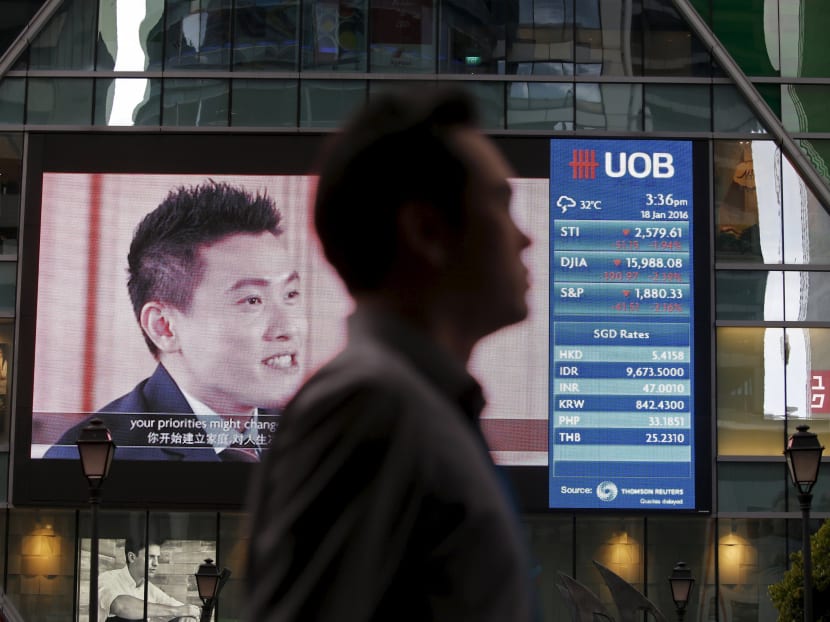Year of monkey sees more mischief in markets
SINGAPORE — Singapore’s stock market ushered in the year of the monkey in a less than auspicious manner with the key Straits Times Index (STI) falling as much as 3.2 per cent before recovering some of the losses, amid worries about banks, an oversupplied oil market driving prices down and slower Chinese economic growth.

A man passes a board showing the decline of Straits Times Index, Dow Jones Industrial Average and the Standard and Poor's index at the central business district in Singapore on Jan 18, 2016. Photo: Reuters
SINGAPORE — Singapore’s stock market ushered in the year of the monkey in a less than auspicious manner with the key Straits Times Index (STI) falling as much as 3.2 per cent before recovering some of the losses, amid worries about banks, an oversupplied oil market driving prices down and slower Chinese economic growth.
The STI fell to as low as 2,538.79 points before paring losses to finish down 1.6 per cent at 2,582.10, following a four-day weekend for the Chinese New Year holidays. Among the most active stocks were Singtel, which declined 1.08 per cent, DBS, which lost 1.62 per cent, Global Logistic Properties, which declined 2.98 per cent and CapitaLand, which fell 3.01 per cent.
Ahead of the Lunar New Year holidays, the STI had climbed higher in two consecutive sessions, moving 2.8 per cent during that period. The index is now down 10.4 per cent this year.
“Amidst the turbulence of the last few weeks, sources of comfort have been hard to come by. Emerging market economies have continued to struggle. Global manufacturing and trade has remained weak. The collapse in oil prices has hurt not only the global economy but has been sucking liquidity out of financial markets,” Mr Nick Kounis, Head of Macro & Financial Markets Research at ABN AMRO said in a note.
Markets remained closed in China, Hong Kong, Taiwan and South Korea for the Chinese New Year holidays.
Stocks in Malaysia lost about 1 per cent on resuming trade after the four-day weekend. Indonesia extended losses for a second day, pulling further away from a near six-month closing high hit late last week.
China, which will remain shut for the entire week, reported Sunday its foreign-exchange reserves shrank US$99.5 billion (S$139 billion) in January to US$3.23 trillion, the smallest level since 2012.
Oil rose towards US$31 a barrel after four days of declines, supported by the prospect of OPEC and rival producers cooperating to tackle a supply glut that has sent prices to a 12-year low.
Iran’s oil minister said Tehran was ready to negotiate with Saudi Arabia and the Kremlin’s oil tsar Igor Sechin proposed producing countries reduce output by 1 million barrels per day — without saying whether non-OPEC member Russia would cut.
While traders and delegates from the Organization of the Petroleum Exporting Countries are sceptical any deal between the group and rival producers — which would be the first in over a decade — will happen, the prospect is supportive for the market.
“If prices drop further, the chance for joint action increases and this in turn should prevent a further sharp drop in prices,” said Mr Carsten Fritsch of Commerzbank.
Market players are awaiting US Federal Reserve Chair Janet Yellen’s semi-annual monetary policy testimony before Congress later in the day, expected to provide indicators on the interest rate outlook in the United States.
While Ms Yellen is expected to defend the Fed’s first rate hike in a decade last year and likely insist that further increases remain on track, any signs of a departure from such a stance in the wake of global growth concerns could provide risk assets with a breather.
“The narrative that she faces is that the US economy and asset markets are being sucked into the downdraft caused by oil, China, emerging markets, reserve manager and sovereign wealth fund asset selling, commodities, currency war, the strong dollar, weak European banks, weak Japanese banks, weak US banks and policy ineffectiveness...to name a few,” wrote Mr Steven Englander, global head of FX strategy at Citi.
Friday’s payrolls report showed US employers added 151,000 jobs in January, sending the unemployment rate to an almost eight-year low of 4.9 per cent and pushing average hourly earnings up 2.5 per cent from a year earlier. That followed a 2.7 per cent jump in wages in December, the biggest advance since mid-2009.
Traders raised the possibility of at least one Fed rate increase this year to 53 per cent, up from 46 per cent tomorrow before the report. AGENCIES





